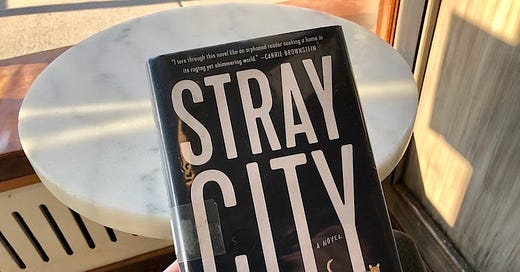Hello and good morning.
It’s been a minute since I showed up in your inbox with this particular newsletter, but I hope your year is going well so far. Or at least not worse than the last one. I’m all about reasonable expectations.
Speaking of which, this newsletter will be shifting into a more reasonable (read: lower effort) cadence moving forward. I’m tentatively thinking of monthly editions, maybe with multiple short reviews in each one, but don’t hold me to that.
Anyway, this week’s rec is the first novel I read this year. I came across it after googling something like “books to read after a lesbian breakup,” though when I tried to find the exact listicle just now, I discovered that my search history from that period of time is a depressing abyss. I will not be digging any deeper.
On a lighter note, reply to this email if you wanna discuss that upcoming Dakota Johnson movie. Sounds promising, no?
— Becca
Stray City by Chelsey Johnson
Fiction, March 2018
Set mostly in Portland in the ‘90s, Stray City tells the story of Andrea Morales, a lesbian who sleeps with a man while reeling from heartbreak. Though she does her best to keep this transgression from her tight-knit, queer circle of friends, it all comes to light when she discovers she’s pregnant and decides to keep the baby.
Lest you worry that this is the story of a queer woman overcoming her queer tendencies as soon as she “meets the right man,” let me reassure you that’s very much not the case. It’s also not a story of bisexuality, which, as a bi gal myself, I’m allowed to say is a relief.
Instead, Johnson uses Andrea and her secret hetero tryst as a way to turn the tables on the trope of sexual experimentation. Countless books, TV shows, and movies use brief queer flings as a means of self-discovery for their straight characters. Remember that SATC plotline where Samantha has a girlfriend? Or the entire movie Kissing Jessica Stein?
This idea that same-sex relationships are an experimentative phase is a widespread one, especially when it comes to young women. There’s even a whole Wikipedia page dedicated to the LUG, which accurately describes about half the friends I had in college—though I’m getting off track here, and that’s probably an essay for another time.
In Stray City, we see a young woman do the opposite: experiment with men. In a joint interview with Carrie Brownstein for the L.A. Times, Johnson explains:
I wanted heterosexuality to be the weird thing you dabble in: how out of character, how off-brand, how strange and repulsive. We will disown you if you do it. I don’t think straight people are used to being the repulsive side of things. They’re not used to being the demonized or othered.
It’s an interesting concept. It’s also one that’s bound to piss some people off, and you can tell by skimming the title’s one-star Goodreads reviews that it did. After all, as queer people, we’re inclined to sympathize with people who are ostracized for their sexuality. We generally see these characters as inherently good, and anyone who makes them feel othered as inherently bad.
A story that positions a heterosexual man and a woman who sleeps with him as somehow transgressive, then, is naturally a little irritating—especially when it also depicts a group of lesbians as judgmental and narrow-minded. When these are the two sides, who among us wants to side with the straight man?
To Johnson’s credit, Ryan (the straight man in question) is a fairly likable guy. He’s a drummer in a punk band who definitely has an avoidant attachment style, but has the misfortune of falling in love with a cool lesbian who will never love him back. The latter part is relatable enough to win him some points.
But the book isn’t here to defend straight men, and it certainly isn’t here to villainize lesbians. While it pokes at the hypocrisy of queer people who take it upon themselves to police others’ sexual behavior, it ultimately sets out to show queer community at its best. Andrea’s circle isn’t the kind of idealistic “chosen family” we so often see in fiction, but they love and support each other in a way that feels all warm and fuzzy to read.
And as a post-breakup distraction, I found it pretty satisfying. Though Andrea’s heartbreak at the start is a relatively minor part of the plot, I’ve been turning this chunk (from a letter Ryan writes to his then-unborn child) over in my brain since I read it:
I’ll tell you this one thing I’ve figured out in my life: things recede so quickly if you let go even a little. For better or for worse. Family members, friendships, old wounds, old futures. You can fight this and hang on to everything and let the drag accumulate until you can hardly move forward, like Andrea. Or you can open up your fists and let go. Shed. Keep what you need for now and trust that what you need later will show up then. Keep your eyes on the road and you’ll be safe. Safer.
Open up your fists and let go. It’s solid advice.
Queer points:
+4 for a self-appointed “Lesbian Mafia”
+7 for “chance baby will be queer too—genetic factor?” being a key item on Andrea’s pro/con list re: having a baby
Buy it on Bookshop



